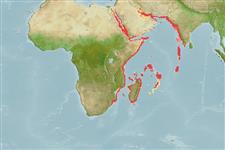Common names from other countries
>
Eupercaria/misc (Various families in series Eupercaria) >
Sparidae (Porgies)
Etymology: Polysteganus: Greek, polys = a lot of + Greek, stego, stege = covered (Ref. 45335).
More on author: Klunzinger.
Environment: milieu / climate zone / depth range / distribution range
экология
морской ассоциированный с рифами; пределы глубины ? - 500 m (Ref. 100719). Tropical; 31°N - 28°S
Western Indian Ocean aand East Africa: including the Red Sea and probably Kenya.
Size / Вес / Возраст
Maturity: Lm ? range ? - ? cm
Max length : 60.0 cm TL самец/пол неопределен; (Ref. 3198); common length : 35.0 cm TL самец/пол неопределен; (Ref. 30573)
Краткое описание
определительные ключи | морфология | морфометрия
колючие лучи спинного плавника (общее число) : 12; членистые (мягкие) лучи спинного плавника (общее число) : 10; колючие лучи анального плавника: 3; членистые (мягкие) лучи анального плавника: 8. This species is distinguished from its congeners by the following set of characters: scale rows above lateral line 6½; scales rows between 5th dorsal-fin spine base and lateral-line scale 5½ or 6½; pored lateral-line scales 51 or 52; suborbital depth subequal to or greater than the orbit diameter; dorsal-fin rays are reddish pink as well as similar reddish pink on upper margin dorsal-fin ray (no clear yellow or faint yellowish); body with 7 or 8 faint irregular blue spotted lines, not visible from all angles; reddish membranes on caudal-fin lobes and caudal fin with clear white lowest margin of lower caudal fin lobe; without blue iridescence on each scale of dorsal and lateral sides of whitish pink body; canines are large, both upper and lower canines on both jaws usually visible even when mouth closed; body deep 44-46% (mean 44%) of SL; anal- and pelvic- fin rays are whitish or reddish hyaline; no yellow (white) rear margin of branchiostegal rays and membrane; weak bony bulge present before and above eye, forming a low median ridge in larger specimens of over 30 cm SL; caudal fin is moderately forked (Ref. 106993).
Occurs mainly in deep waters around reefs (Ref. 30573). Carnivorous predator (Ref. 30573). Sold fresh in markets.
Life cycle and mating behavior
Maturities | размножение | Spawnings | Egg(s) | Fecundities | личинки
Bauchot, M.-L. and M.M. Smith, 1984. Sparidae. In W. Fischer and G. Bianchi (eds.) FAO species identification sheets for fishery purposes. Western Indian Ocean (Fishing Area 51). volume 4. [var. pag.] FAO, Rome. (Ref. 3507)
Статус Красного Списка МСОП (Ref. 130435)
CITES (Ref. 128078)
Not Evaluated
Угроза для людей
Harmless
Использование человеком
рыболовство: коммерческий
дополнительная информация
инструменты
Специальные отчеты
Скачать в формате XML
ресурсы в Интернет
Estimates based on models
Preferred temperature (Ref.
115969): 14.2 - 24.7, mean 20.5 (based on 105 cells).
Phylogenetic diversity index (Ref.
82804): PD
50 = 0.5039 [Uniqueness, from 0.5 = low to 2.0 = high].
Bayesian length-weight: a=0.01259 (0.00609 - 0.02604), b=3.04 (2.87 - 3.21), in cm Total Length, based on LWR estimates for this (Sub)family-body shape (Ref.
93245).
Trophic level (Ref.
69278): 4.1 ±0.7 se; based on size and trophs of closest relatives
устойчивость к внешним воздействиям (Ref.
120179): низкий, минимальное время удвоения популяции 4.5-14 лет (Preliminary K or Fecundity.).
Fishing Vulnerability (Ref.
59153): Moderate vulnerability (44 of 100).
